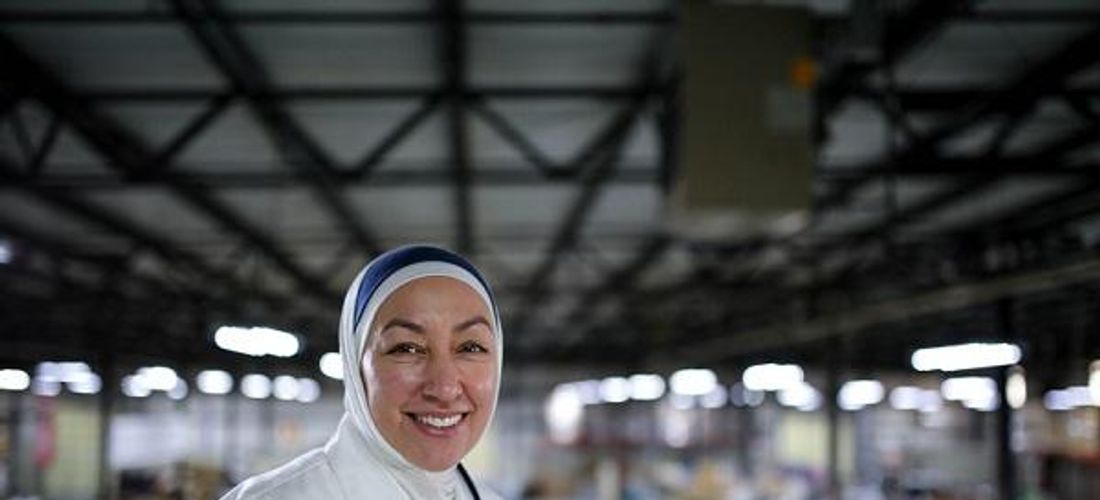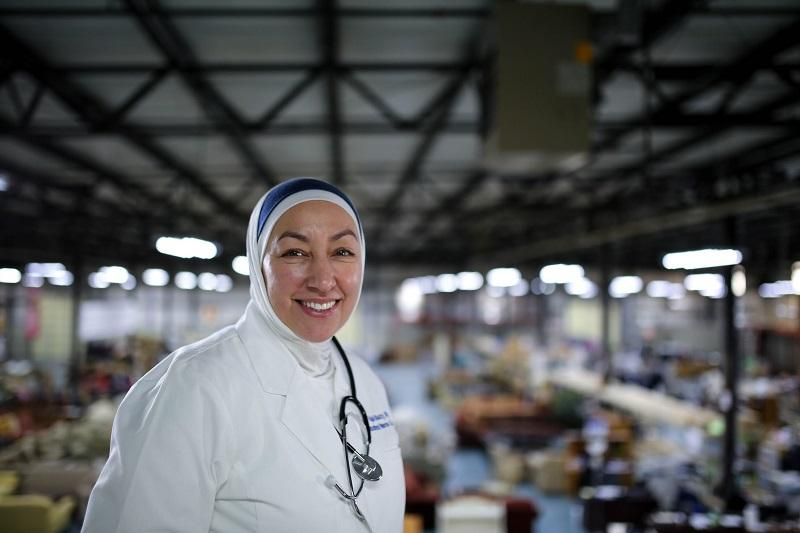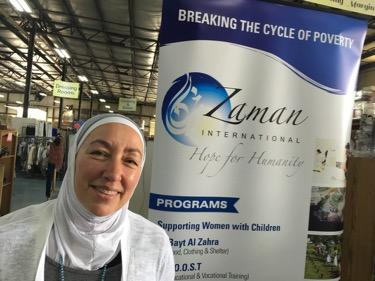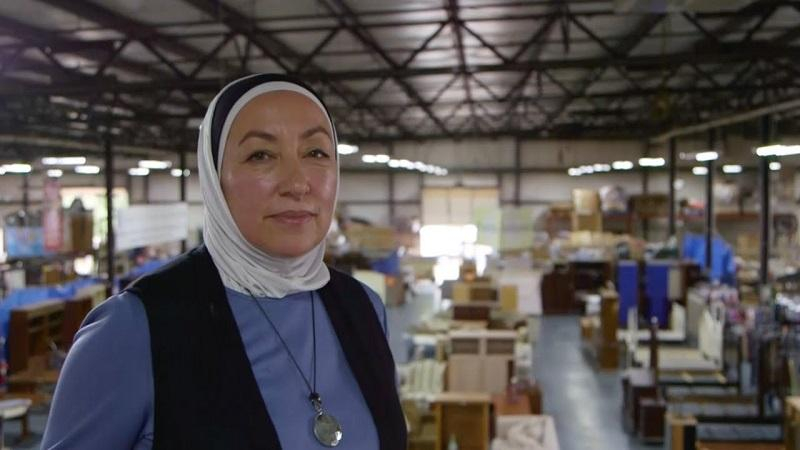From Nurse to 2019 CNN Top Ten Hero – Meet Detroit's Najah Bazzy
Community
|
Nov 27, 2019
|
8 MIN READ

By Nargis Rahman
A typical day for Najah Bazzy consists of bouncing around from one place to the other starting from 8 a.m. and generally not ending until past 11 p.m. It includes everything from spending time with her family to leadership meetings and burial services, with her running her non profit humanitarian organization, Zaman International, from her phone as she runs around town.
Zaman International, which provides social services to marginalized women and children to break the cycles of poverty, serves 465,804 people globally, according to the 2018 annual report. Zaman means “time” Najah told a crowd at a TEDxDetroit earlier this month. “How we spend time in the stewardship of others.”
Zaman is built upon the idea of providing people with hope, listening to what they need and allowing people to decide what is best for themselves. “Hope is intrinsic. It exists in the heart of every single soul. If you take away hope you shut out the light. If you shut out the light, there’s nothing but darkness. So be careful that you provide hope to the people. Don’t define it for them, allow them to define it for themselves,” she said in the talk.

Image source: Najah Bazzy, Zaman International
Najah is the founder of Zaman and one of the 10 finalists for the 2019 CNN Hero award, a program that was established in 2007 to recognize “everyday people doing extraordinary things to change the world.”
“The CNN recognition belongs to everybody,” says Najah. However if Najah wins, Zaman will receive $100,000, which will be used to build out a commercial sewing center for women at the Hope for Humanity Center in Inkster, Michigan.
“[The fact that] Zaman is going to carry on through generations of young people makes me so happy. I do hope Zaman is going to grow into the world,” says Najah.
Voting ends Dec. 3. People can vote up to 10 votes a day here via Facebook and email. Winners will be announced live on Dec. 8 at 8 PM Eastern on CNN globally.
How does she do all she does? Najah’s work ethic comes from a moment during one of her trips to hajj (she doesn’t remember the year) when she decided the one thing that would largely guide her life:“I submitted my schedule to Allah.”
Humble Beginnings
Najah’s grandparents moved to the U.S. in 1885. She was born to a Sunni Syrian mother and Shi’a Lebanese father, important to note because Najah says, “My parents raised me to be Muslim first.” She remembers her mother saying to her, “There is one God, there is one Quran. There is one qibla, and there is one Ummah, and we are one family.”
She grew up in a diverse neighborhood in the south end poverty hub of Dearborn, where immigrants moved to work for Ford, GM or Chrysler auto plants. Kids were all friends, neighbors sat on the porch, and people were apart of the United Auto Workers union with a strong allegiance to the country, she says. As a child, Najah was an Arabic interpreter in school. Teachers took an interest in her from a young age, she says, which she believes prepared her in her future work.
Najah became a transcultural nurse, facilitating cultural competency and dialogue between patients and providers. In 2012, she was featured in a PBS documentary, “Muhammad: Legacy of a Prophet,” in which she discussed the positive effects of playing the Quran for dying Muslim patients and raising a faith-based family in the U.S.

I recently ran into Najah at a Center for Medical Education conference on caring for all within the social determinants of health. These are, “Conditions in which people live, play and work which impacts people’s health to a greater degree than biomedical conditions,” says Dr. Ijeoma Nnodim, assistant professor at Wayne State University School of Medicine. Ijeoma moderated and presented at the conference. “This includes socioeconomic status, education, early childhood experiences and where they live,” says Ijeoma.
Najah asked 40 physicians and a few administrators what aspects of end-of-life healthcare they cared about. She works to educate caregivers in social conscious patient care. Together, through the process of self-discovery, the group found out they wanted more time with family, spirituality and privacy – something Najah wants them to consider when caring for patients. That’s the beauty of working with Najah – she helps you realize these things for yourself.
The first time I met her was in 2007 during a talk about the hijab that she gave to students for Wayne State University Muslim Students’ Association Islam awareness week. Najah reorganized the seats from the lecture style to a discussion circle and told us: We all come from the same human family of Adam and Eve. She invited the hijabi women to share their stories of how they came to wearing hijab to the group of mostly Muslim students and a few non-Muslims. I left the room feeling empowered to speak my own truth to power.
For those who know Najah, this is the essence of who she is – a person who empowers people to explore who they are and how that connects to the human family. “It doesn't matter who or what they are. To me it's the connection to God because He created that [as the highest expression of spirituality],” she says.
Family First, Then Community
Najah was a stay-at-home mom to her four children for the early part of their lives until they entered middle school. “Family first,” she says. “I am strict in God because I am going to return to Him. I believe no matter what I do (Allah) is going to ask me on mandatory duties first and then everything else. I run my life that way.”
Upon returning to work in 1996, she discovered an Iraqi family who was in dire need of basic necessities during a home care visit. They had placed their infant in a laundry basket atop a pile of clean towels. They had nothing. She filled up her van and delivered furniture and supplies to the family. This is how Zaman was born. She says that in the early years of Zaman, on the weekends she and her kids would go shopping and deliver goods to those in need. “We integrated it into our lives … [It was a] natural thing to do as a family,” she said.
That same year Najah founded the Young Muslim Association, now called the Muslim Youth Connection, to provide leadership and community service training for her kids and the youth in the community. “By that time Dearborn had become very Arab-centered. I was so thirsty for the youth to understand diversity,” she said. These YMA youth became an integral force for Zaman, putting together soup kitchens, packing and delivering goods. From 1996-2010 Najah continued to work with the youth out of her van.
Zaman became a full-fledged nonprofit in 2004. In 2010 Najah asked the community for a desk and phone to support her work. Drs. Nader and Rima Bazzi, local dentists, donated an office space. This enabled Zaman to host events and expand by about 40 percent each year, she says. Zaman then crowdfunded $520,000 to purchase and renovate the current 40,000 sq. ft. “one-stop hope center” and moved there in 2016. Projects include providing food, clothing, vocational training and shelter for women in need. They also supply humanitarian aid in Yemen, Ethiopia, Lebanon, Syria, Iraq and Gaza in Palestine.
According to Zaman’s 2018 annual report, the organization has 444 active partners ranging from health care professionals to clergy. It operates with a team of 2,000 regular volunteers. Najah believes Zaman has the potential to grow further globally.
“We all have mountains and valleys in our life. When you’re at the top of the mountain, do not look up. It will put you in a place of arrogance. Look in the valley, and in the valley is where we learn ... Be sure when you’re in the valley you look up again at that mountain and you will climb it,” said Najah in her TED.

Najah Bazzy at Zaman International; Image source: CNN's YouTube video.
Zaman Modeled After ‘Public Health Nursing’
Najah uses the MASLOW's hierarchy of needs, a five-tier model that shows that people’s basic needs must be met prior to growth and self-actualization, and the globally-recognized Sunrise Model by Dr. Madeleine Leininger on transcultural nursing, to guide and build her leadership and services at Zaman.
“Zaman is an extension of public health nursing,” says Najah. Dr. Leininger was her mentor at Wayne State University, And Najah decided to bring her Sunrise Model to Detroit. The model bridges the need for healthcare providers to understand the culture of patients to effectively care for them.
Today, Zaman hosts philanthropic events and fundraisers through the Zaman Annual Run/Walk Picnic. The organization attracts people nationally, with guests coming in from places like Notre Dame to learn about the organization.
Najah also works with interfaith leaders to bring people together through faith-based nursing by giving trainings, presentations and talking to people about providing dignified social services.
Nancy Combs is a board member of the InterFaith Leadership Council of Metropolitan Detroit and a member and ordained elder of the Fort Street Presbyterian Church. She’s known Najah since 2001. They were introduced by a mutual friend, Eide Alawan, and have been good friends ever since. They worked on interfaith programs post 9/11 to educate people about Islam. “I learn from her every time I’m with her,” she says.
In spring of 2018, Nancy fractured her leg. She said Najah sent her Buddhist prayer beads, which are similar to a rosary. “I always have them. They mean so much to me.” This is what Najah means by culturally-competent care.
Nancy takes several groups to Zaman to learn about what she calls a social service agency that’s more like a “handshake” rather than a “handout.” “I’m inspired by the mutually respectful environment. It feels like a blessing when you walk through the door.”
Najah says her CNN Top 10 nomination is an honor that comes with responsibility.She says she has been receiving requests to give talks due to her CNN nomination. “If God has privileged me with that its huge responsibility I hope I am able to execute it with dignity and respect that our faith deserves,” she says.
At Haute Hijab Changemakers events, CEO Melanie Elturk advises women to seek whatever they are passionate about and use it create good change in the world, however big or small. Najah’s philosophy is the same, and her work is an example for us all. Najah told the audience at the TEDxDetroit to focus on one’s own priorities, seek out similarities instead of differences, and to find their own passion. “There is a universe in every single one of us. ... You are created with a fingerprint that nobody else has, but you. You are unique. You are powerful. You have a purpose. Find your passion and fulfill your purpose.”
Subscribe to be the first to know about new product releases, styling ideas and more.
What products are you interested in?

